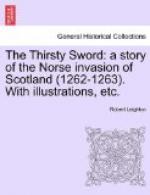“A girl was indeed with me. But — ah, surely Aasta cannot have done this thing?”
“Aasta? That is a Norse name. Well, ’tis no business of mine,” said the captain; “and now will I return to Rothesay well content that your people have received no greater injuries than they now suffer at the hands of my friends your enemies. Give you goodnight, my lord.”
“By my faith, a right honest man!” said Kenric as Thorolf rode away.
“And a good Christian, if I mistake not,” said the abbot, who had heard the conversation.
“Ay, and a gallant soldier to boot,” added Allan Redmain. “But for his turning upon those ruffians, methinks it would have gone ill with Kenric and my sister Ailsa.”
“God be thanked for our escape,” murmured the abbot. “And now, if Roderic and his crew come not back over soon, all may yet go well with us. At sunrise we will all set forth with picks and shovels and give a true Christian burial to both friend and foe alike. And God rest their souls, one and all.”
CHAPTER XXVII. THE BATTLE OF LARGS.
Two weeks of gloomy weather passed, with clouded skies and fitful winds. During that time nothing was heard in Bute of either Roderic the Rover or King Hakon of Norway. Kenric and his men, with the priests of St. Blane’s, made busy work in burying the dead. Also, they got all their shipmen and fishers, farm workers and shepherds, to build up the devastated cottages and farmsteads, and one by one these dwellings again received their wonted inmates. The villages of Rothesay, Ardbeg, Kames, Ascog, and other settlements in the island had been roughly handled by the invaders, and many farms had been despoiled. But for the greater part the shells of the houses had been left standing, and there were many hands to make light work of restoring them.
The Lady Adela of Rothesay, Lady Grace de Currie, Ailsa Redmain, and the women of Rothesay Castle took up their quarters in the nunnery attached to the barony of St. Blane’s, for none would return to the castle while yet a Norseman remained therein; and Kenric had passed his word that he would not attempt to regain possession of his stronghold until the kings of Norway and Scotland had settled their dispute.
On the last day of September Sir Piers de Currie, Kenric, and Allan — now Sir Allan Redmain, for the knighthood of Scotland was hereditary — were walking over from Ascog, when, looking towards the seaboard between Arran and the Cumbraes, they observed a great fleet of ships, with many flags flying from their masts, making across the Clyde. A hundred and fifty war galleys there were in all.
“The saints protect us!” cried Allan. “What means all this?”
“’Tis even as I expected,” said Kenric. “They are the ships of Hakon of Norway, who now intends to invade the mainland.”




